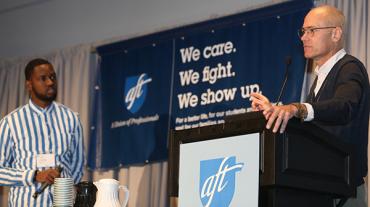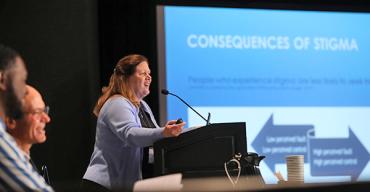The opioid crisis affects all AFT members whether they are health professionals, educators or public employees; a joint breakfast on Saturday morning brought members from three AFT divisions together to learn more about ways to address the crisis.
Large pharmaceutical companies, often dubbed “Big Pharma” have played a role in creating and feeding the opioid crisis, and as it has grown, these companies have tried to profit from treating addiction by investing in for-profit treatment centers and the drugs used to reverse opioid overdoses.
“Our current opioid crisis has been fueled by the illegal marketing and over-prescription of opioids, and a handful of pharmaceutical executives and hedge fund managers have made billions from it,” said Charles Khan (shown above at left), organizing director at the Strong Economy for All Coalition. “They are the villains that turned this campfire into a forest fire.”
Michael Kink (shown above at right), the coalition’s executive director, pointed out that while the billionaires who built their fortunes on marketing opioids are seen as respected philanthropists, it's the street-level dealers who are demonized. During their presentation, Khan and Kink revealed to the audience some of the most prominent Big Pharma billionaires, calling them “opioid profiteers.”
“Solutions to this crisis need to start with accountability,” said Khan. “That is why we showed you these billionaires, so we can target them as the real villains.”
Khan and Kink have worked with Hedge Clippers to produce reports that examine how these profiteers operate; the reports lay out a road map of ways that organizations and communities can fight back.
Two solutions to the crisis that Khan discussed include building a public health response that doesn’t criminalize opioid abuse and creating policies that would impose an excise tax on opioid prescriptions or a windfall profits tax on pharmaceutical companies. And Kink noted the work the Strong Economy for All Coalition is doing with the AFT and others to craft and lobby for such policies at the federal and state levels.
Thomasine Heitkamp (pictured above), a professor of nursing at the University of North Dakota, has researched some of the best ways to get people on the path to recovery. She told breakfast attendees that prevention, treatment and recovery require those who deal with addicts and addiction to know what opioid use “looks like” and advises them to stay current on evidence- based practices.
“Everyone has a different path to recovery, but it’s important to acknowledge that substance use disorder is a chronic disease”— in the same way that diabetes and hypertension are chronic diseases.
She pointed out that the stigma of addiction must be addressed as well. “Stigma prevents people from seeking treatment.” The answer to helping addicts, Heitkamp said, is through integrated care. “Behavioral health and primary care should be done together. We can’t solve this problem unless we work inter-professionally.”
The breakfast also provided an opportunity to introduce a partnership between the AFT and Harvard Medical School, which has developed online training on opioid addiction and intervention. Delegates got a sneak peak of the training via a video, which features an introduction by AFT President Randi Weingarten.
[Adrienne Coles; Photos by Pamela Wolfe]


